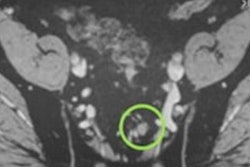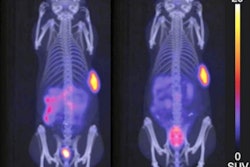
Pairing radionuclide therapy with immunotherapy can successfully slow prostate cancer progression and increases survival time, according to new research published in the February edition of the Journal of Nuclear Medicine.
The mouse study revealed radionuclide therapy promotes prostate cancer immunogenicity by stimulating a cellular response that makes the tumors more receptive to immunotherapy.
A research team led by Dr. Johannes Czernin from the molecular and medical pharmacology department at the David Geffen School of Medicine, University of California, Los Angeles gave mice bearing prostate cancer tumors one of four treatments:
- An isotope control antibody
- Radionuclide therapy with actinium-225 (Ac-225) PSMA-617
- An anti-PD-1 antibody
- Both Ac-225 PSMA-617 radionuclide therapy and an anti-PD-1 antibody.
The research team evaluated therapeutic efficacy by measuring tumor volume with CT, time to progression, and survival.
The group found Ac-225 PSMA-617 radionuclide therapy and PD-1 blockade alone resulted in prolonged time to progression as compared with the isotope control (30 days and 33.5 days, respectively, versus 25 days).
However, pairing Ac-225 PSMA-617 radionuclide therapy with PD-1 blockade significantly improved time to progression (47.5 days). Survival time also increased to 51.5 days versus 32 days with Ac-225 PSMA-617 radionuclide therapy, 37 days with anti-PD-1, and 28 days with the control.



















